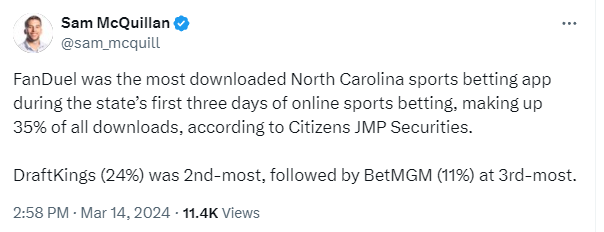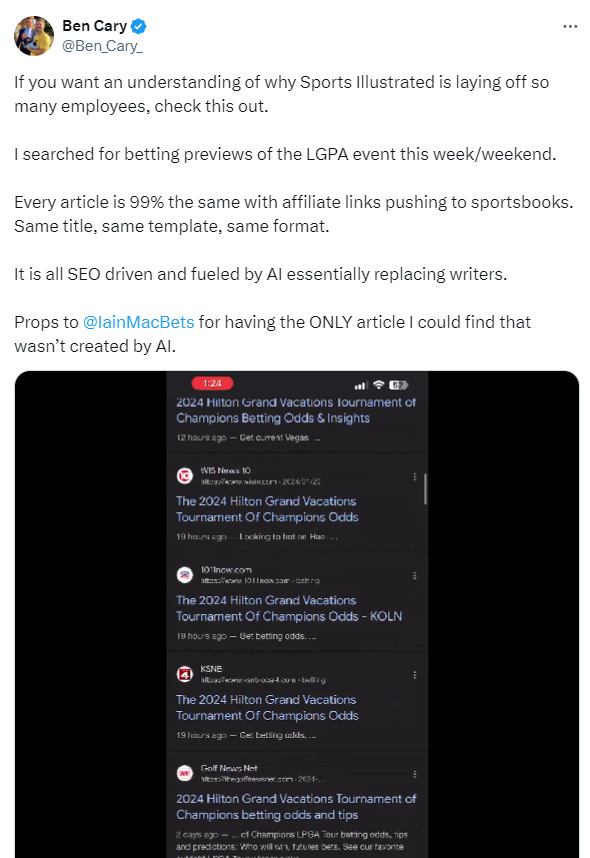Road to Nowhere
Talking heads will tell you the Maryland online casino bill is making progress, but despite passing the House, the legislation faces an uphill battle.
The Bulletin Board
NEWS: The Maryland online casino bill has passed the House, but its prospects remain on shaky ground.
BEYOND the HEADLINE: Desperation sets in as online casino efforts flounder.
WEEKEND CATCHUP: Bally’s to launch in MA in Q2; DraftKings announces Stat Sheet RG feature; AGA’s March Madness estimates.
NEWS: Early North Carolina numbers point to the Tarheel State being a Top 5 mobile betting market.
NEWS: A trio of gambling bills in New York dealing with PG funding, advertising, and age requirements have advanced to the Senate floor.
AROUND the WATERCOOLER: AI is throwing S-E-O(ut the window).
STRAY THOUGHTS: Hollow victories.
SPONSOR’S MESSAGE - Sporttrade was borne out of the belief that the golden age of sports betting has yet to come. Combining proprietary technology, thoughtful design, and capital markets expertise, our platform endeavors to modernize sports betting for a more equitable, responsible, and accessible future.
Learn more about what makes Sporttrade an unparalleled player experience here.
Maryland Online Casino Bill Passes House
In a late flurry of activity to beat today’s crossover deadline (the final day for legislation to pass its house of origin), the Maryland online casino bill was amended and passed by the House Ways and Means Committee last week. On Saturday, it was passed by the full House.
As a constitutional amendment, the bill required a 3/5 vote to pass and squeaked by with a 92-43 vote (68%).
As reported last week, the new bill increased the potential number of licenses (while complicating the licensing process with a laundry list of social equity benchmarks) and prohibited the use of credit cards.
The bill faces a slew of challenges, including a far more resistant Senate, opposition from labor, a cannibalization argument that won’t go away, negative polling that gives any lawmaker looking for an out a convenient excuse to kick the can down the road, and the usual concerns from responsible gambling advocates and the anti-gambling crowd.
Even the typical supporters have concerns about the House’s online casino bill. The tax burdens are severe, and the amendment prohibiting the use of credit cards raises the question of how hard the industry will fight for the bill.
Zooming in on the Senate, the Senate and House are divided on this year’s budget. The House is trying to find long-term solutions to education funding (online casinos being a cog in that wheel), and the Senate is willing to balance the budget this year without raising taxes or new gambling revenues.
Sen. Ron Watson told Bonus.com, “The general consensus of the Senate is that a balanced budget has been developed and submitted. And, as such, no new taxes are required, nor are they ready to entertain this new revenue stream.”
Beyond the Headline: When Desperation Sets In
After several years of rapid growth on the mobile sports betting front, 2023 was supposed to be the year legislative attention shifted from sports betting to online casinos. That shift did not happen, with the industry scoring just a minor victory in Rhode Island.
2024 is shaping up to be even worse, with online casino legalization unlikely. The only glimmer of hope is the aforementioned Maryland.
With online casino legalization at a standstill, several companies that operated sportsbooks while bidding their time for online casinos to arrive have decided to exit the US. Several others have stayed but pulled back on their mobile sports betting operations, choosing to focus on the few omnichannel (sports and casino) states.
With Maryland as the only target remaining, the question is, is the industry so desperate to open a new online casino state that it will accept Maryland’s terms (a 55% tax rate)? Or will it fight tooth and nail for favorable amendments in the Senate and hope a compromise between the two chambers can be reached?
The former would set a very dangerous precedent moving forward, while the latter will likely be the final nail in the coffin for online casinos this year.
Weekend Catchup: Bally’s MA Launch in Q2; DraftKings Announces Stat Sheet; AGA March Madness Estimates
Bally’s MA launch: According to the Massachusetts Gaming Commission, Bally’s hopes to launch its mobile sports betting app by the end of Q2. Bally’s was one of the original 12 applicants and will boost the number of MA mobile betting apps to seven, as many of the original 12 have decided not to pursue a license or pulled their product from the market.
DraftKings’ Stat Sheet: DraftKings has launched a new responsible gambling feature called Stat Sheet, which will be available across all DraftKings and Golden Nugget products. Per the press release, Stat Sheet is “a gaming tool that gives players the ability to assess, track, and interact with their personal stats through intuitive charts and information.” All operators should offer this type of customer transparency, and I suspect it will be universally available soon.
AGA March Madness Projections: The American Gaming Association (AGA) has released its betting projections for March Madness, and the $2.72 billion is extremely close to the projections from Eilers & Krejcik Gaming (a newsletter sponsor) that STTP reported on last week. The AGA estimates are typically much larger ($15.5 billion last year) than in the past, when they used surveys and included bracket pools and other types of gambling. 2024 is the first time the AGA has focused entirely on legal betting and based its projections on its commercial gaming revenue tracker.
SPONSOR’S MESSAGE - Underdog: the most innovative company in sports gaming.
At Underdog we use our own tech stack to create the industry’s most popular games, designing products specifically for the American sports fan.
Join us as we build the future of sports gaming.
Visit: https://underdogfantasy.com/careers
Early Numbers From North Carolina
According to data released by GeoComply, more than 370,000 bettors were active during the first 48 hours of North Carolina’s mobile sports betting launch.
That compares favorably to other launches. While not an apples-to-apples comparison, here is how North Carolina compares with some other state launches:
Maryland, population of 6.2 million, (five days) 477,000 active accounts
Massachusetts, population of 7 million, (three days) 400,000 active accounts
Ohio, population of 11.8 million, (two days) 784,000 unique accounts
I wrote a feature column on GeoComply launch data in October: It’s Been One Week. A deep analysis of geolocation transactions and active accounts over the first seven days in the five most recently launched mobile sports betting states.
Another early data point is app downloads (seen in the tweet below), something the folks over at JMP Securities monitor closely:
It’s important to point out that North Carolina mobile betting operators have been preregistering customers since March 1, so these numbers don’t paint a complete picture.
Dustin Gouker noted that Underdog (a newsletter sponsor) was ranked #50 for sports in the App Store.
And then there is this very interesting data point from NEXT.io and Testa on registration time:
According to Testa CEO Kyle Wiltshire, “… PENN Entertainment, Inc’s ESPN Bet lagged way behind all other competitors. Five forms of verification, app switching, and an 8-minute wait for a verification e-mail resulted in a 13-minute, 43-second registration time. Ouch.”
X users have noted ESPN Bet is the only app that requires all registrants to upload an ID, which helps explain the lengthy registration time.
New York Advances 3 RG/PG Bills
Three gambling-related bills were recently passed by the New York Senate Racing, Gaming, and Wagering Committee.
The first deals with gambling advertisements, the second would change the gambling age in the state’s pari-mutuel gambling law from 18 to 21, and the third would increase problem gambling funding.
S1550 is a bill “requiring all advertisements for gambling and sports betting to include warnings about potential harmful and addictive effects of gambling and requiring the state gaming commission to cooperate with the commissioner of addiction services and supports to ensure that all advertisements for gaming activity state a problem gambling hotline number.”
S1557 would “amend the racing, pari-mutuel wagering, and breeding law… in relation to prohibiting individuals under the age of twenty-one from gambling.”
The age requirement would not apply to all forms of gambling in the state, just those that fall under the racing, pari-mutuel wagering, and breeding law.
S8439 would “amend the racing, pari-mutuel wagering, and breeding law, in relation to authorizing one percent of mobile sports tax revenue be used for problem gambling.”
The current disbursement reads: “… one percent of the state tax imposed on mobile sports wagering by this section to be distributed for problem gambling education and treatment purposes… provided however, that such amount shall be equal to six million dollars for each fiscal year thereafter.”
The new law would change that to: “… one percent of the state tax imposed on mobile sports wagering by this section to be distributed for problem gambling education and treatment purposes… provided however, that such amount shall be equal to one percent of mobile sports tax revenue and no less than six million dollars for each fiscal year thereafter.
Around the Watercooler
Social media conversations, rumors, and gossip.
A very thought-provoking post by former professional poker player turned BJJ entrepreneur Cole South on what I’ll call a reckoning with AI and SEO.
South lists some examples, like “motherearthtravel.com exploding with a bunch of AI-generated articles on traveling to Europe convincingly telling you that France still uses the Franc and Romania isn’t part of the EU (it joined in 2007).”
He also explains why this might become a problem for AI “based on publicly available information on the web. Increasingly more of that information is (incorrectly) written by AI itself.”
What’s the solution? South posits that Google is cranking up the algorithm’s “authority” dial, which feels like a short-term solution to a long-term problem, and creating a new set of problems.
Per South, “failing businesses who happen to have high-authority websites… will sell a blog post on any topic to the highest bidder.”
This is something I’ve touched on in the past, and as South put it, that’s “why, of course, we all turn to the Kansas City Star to find the best online psychics, or why we all know the Raleigh News & Observer is the foremost authority on steroids for women.”
A perfect example of this is this tweet by Ben Cary:
Stray Thoughts
I’ve paid close attention to state legislatures for over a decade. One thing I’ve learned is progress isn’t always a step forward.
The online casino bill in Maryland and sports betting legislation in Minnesota (which I’ll dig into in tomorrow’s newsletter) may be working their way through legislative committees, but their prospects of passing are diminishing with every new controversial amendment.









